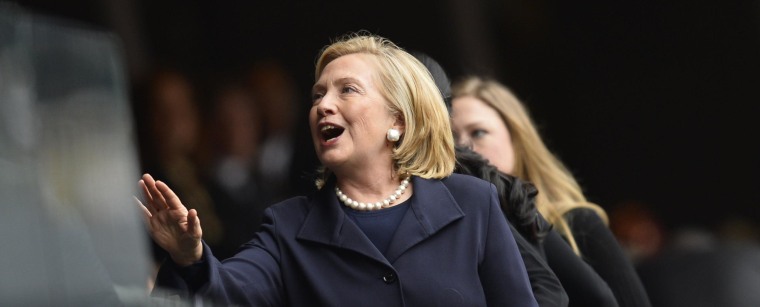The two leading 2016 presidential contenders -- Chris Christie (R) and Hillary Clinton (D) -- are dealing with stories tying them to a culture of payback and bare-knuckles politics.
By now, you know New Jersey Gov. Christie, thought to be one of the most formidable Republican presidential candidates, continues to be embroiled in the bridge scandal, in which high-ranking members of his staff were revealed to have shut off two lanes of traffic from a North Jersey town to the George Washington Bridge for four days. Two of the state’s top newspapers – the Star-Ledger and the Asbury Park Press -- blame Christie for creating a culture of bullying.
“He created the bullying culture that inspired it,” the Star-Ledger writes, adding, “Flexing muscle against a political foe is how Christie likes to do business. He has a reputation of being vindictive toward his political enemies, so perhaps it’s only natural that Bridget Anne Kelly, a top aide, would take cues from him.”
The Asbury Park Press (this reporter's former newspaper) says the “thin-skinned bully” side of Christie’s personality “who will exact retribution against anyone who criticizes him … has been evident in New Jersey throughout his governorship.” They add that it’s a “pattern, born of arrogance. … it is an ethos that apparently was absorbed by his staff — not just some lone rogue actor.”
Flexing muscle against a political foe is how Christie likes to do business.
Meanwhile, The Hill’s Amie Parnes and Politico’s Jonathan Allen report this morning – ahead of a forthcoming book they worked on together -- that Clinton’s 2008 campaign team maintained a spreadsheet of endorsers of her campaign and those who did not, something the outlets call “Hillary’s Hit List”:
“As one of the last orders of business for a losing campaign, they recorded in a Microsoft Excel spreadsheet the names and deeds of members of Congress. They carefully noted who had endorsed Hillary, who backed Barack Obama, and who stayed on the sidelines—standard operating procedure for any high-end political organization. But the data went into much more nuanced detail.”
In fact, it’s such standard-operating procedure that most media outlets, including the NBC News Political Unit had its own spreadsheet of superdelegates, a running tally of endorsers of either candidate. But the Clinton list, apparently, was not just for tracking purposes:
“For Hillary, whose loss was not the end of her political career, the spreadsheet was a necessity of modern political warfare, an improvement on what old-school politicians called a favor file. It meant that when asks rolled in, she and Bill would have at their fingertips all the information needed to make a quick decision—including extenuating, mitigating, and amplifying factors—so that friends could be rewarded and enemies punished.”
It was to the point where Claire McCaskill, a young Missouri senator at the time and early endorser of Obama, told a friend she was scared to be in the same elevator with Clinton, according to Parnes and Allen.
The Clintons, like Christie, are also known to have top aides who play hardball, cash in on favors, and offer incentives for fundraising (like nights in the Lincoln Bedroom) -- even if it's never been proven they've been explicitly told by the principals to exact any type of revenge.
Much of this is politics as usual, but that’s exactly the problem. The public is already highly skeptical of American politics, and the more stories like this come out, the more they cloud the perception of the political process and engender even more cynicism of an already toxic and stagnant political culture.
